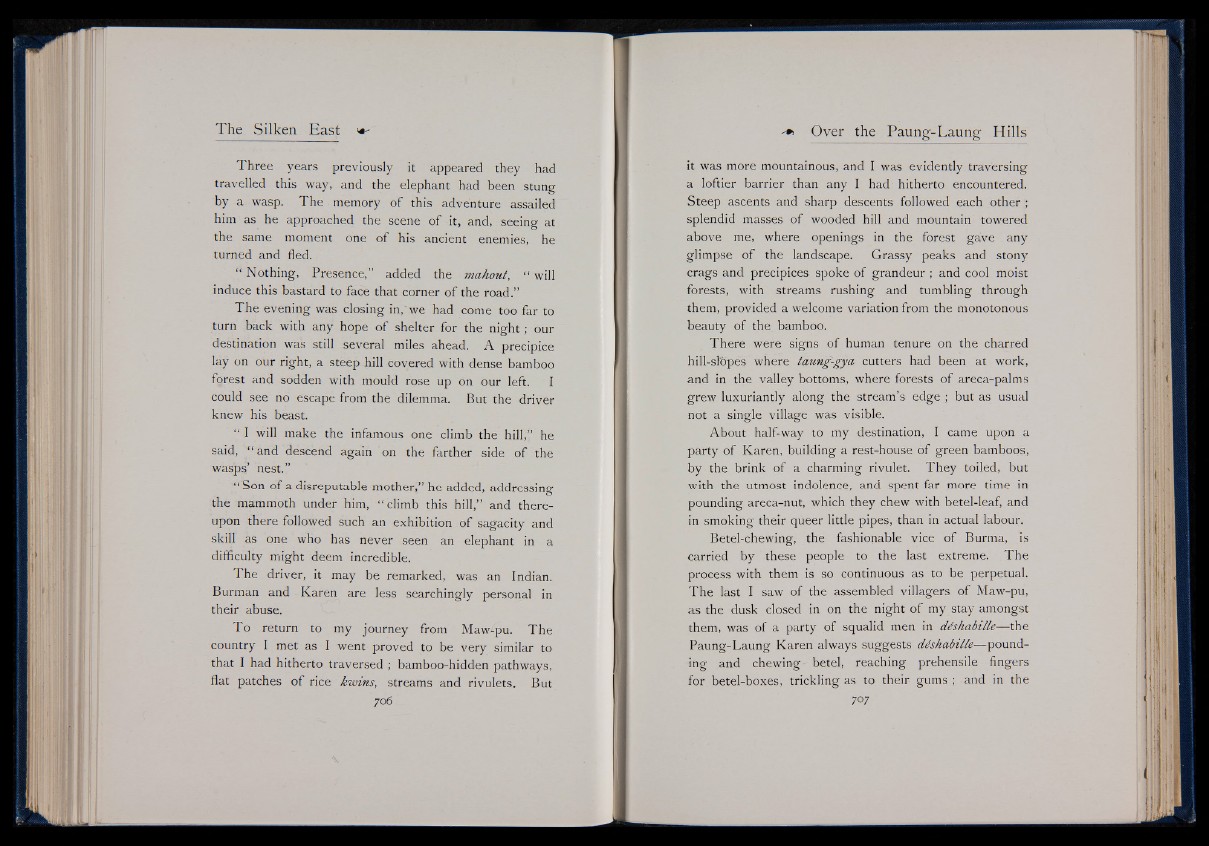
Three years previously it appeared they had
travelled this way, and the elephant had been stung
by a wasp. The memory of this adventure assailed
him as he approached the scene of it, and, seeing at
the same moment one of his ancient enemies, he
turned and fled.
“ Nothing, Presence,” added the mahout, “ will
induce this bastard to face that corner of the road.”
The evening was closing in, we had come too far to
turn back with any hope of shelter for the night ; our
destination was still several miles ahead. A precipice
lay on our right, a steep hill covered with dense bamboo
forest and sodden with mould rose up on our left. I
could see no escape from the dilemma. But the driver
knew his beast.
“ I will make the infamous one climb the hill,” he
said, “ and descend again on the farther side of the
wasps’ nest.”
“ Son of a disreputable mother,” he added, addressing
the mammoth under him, “ climb this hill,” and thereupon
there followed such an exhibition of sagacity and
skill as one who has never seen an elephant in a
difficulty might deem incredible.
The driver, it may be remarked, was an Indian.
Burman and Karen are less searchingly personal in
their abuse.
To return to my journey from Maw-pu. The
country I met as I went proved to be very similar to
that I had hitherto traversed ; bamboo-hidden pathways,
flat patches of rice kwins, streams and rivulets. But
706
it was more mountainous, and I was evidently traversing
a loftier barrier than any I had hitherto encountered.
Steep ascents and sharp descents followed each other ;
splendid masses of wooded hill and mountain towered
above me, where openings in the forest gave any
glimpse of the landscape. Grassy peaks and stony
crags and precipices spoke of grandeur ; and cool moist
forests, with streams rushing and tumbling through
them, provided a welcome variation from the monotonous
beauty of the bamboo.
There were signs of human tenure on the charred
hill-slbpes where taung-gya cutters had been at work,
and in the valley bottoms, where forests of areca-palms
grew luxuriantly along the stream’s edge ; but as usual
not a single village was visible.
About half-way to my destination, I came upon a
party of Karen, building a rest-house of green bamboos,
by the brink of a charming rivulet. They toiled, but
with the utmost indolence, and spent far more time in
pounding areca-nut, which they chew with betel-leaf, and
in smoking their queer little pipes, than in actual labour.
Betel-chewing, the fashionable vice of Burma, is
carried by these people to the last extreme. The
process with them is so continuous as to be perpetual.
The last I saw of the assembled villagers of Maw-pu,
as the dusk closed in on the night of my stay amongst
them, was of a party of squalid men in déshabille—the
Paung-Laung Karen always suggests déshabille—pounding
and chewing - betel, reaching prehensile fingers
for betel-boxes, trickling as to their gums ; and in the
707